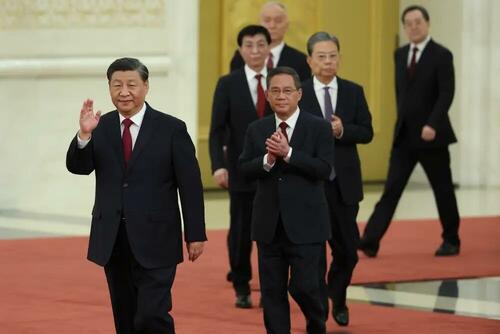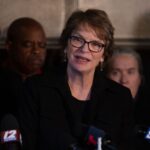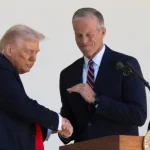
Last summer, Chinese Prime Minister Li Qiang addressed a conference in Berlin and optimistically said: "When it rains hard, it gets muddy. But we must not bow our heads." He added of the world's second largest economy, "Keep your chin up! When the time comes, we will surely see a rainbow. The economy has a natural cycle, in China as well."
But Western press is now going after the Chinese premier and the country's increasingly opaque system and dealings with the outside world. Just ahead of his much anticipated address to the National People’s Congress this week, it has been confirmed that the nation's number two top official won't take questions during what was a long-standing press briefing.

"China’s Li Qiang will become the first premier in three decades to not hold a press briefing at the annual parliamentary meetings, removing a rare platform for investors to learn more about the nation’s policy direction as President Xi Jinping consolidates control over the world’s second-largest economy," Bloomberg reports.
And what's more is that this 30-year long tradition looks to be possibly permanently halted, according to more from the announcement:
The country’s No. 2 official won’t take questions at the close of the National People’s Congress for the rest of its five-year term apart from in “special circumstances,” official spokesperson Lou Qinjian said at a Monday briefing in Beijing. This cohort of lawmakers will gather each year until 2027.
Not only had this Q&A briefing been going on annually since 1993, but its significance was in the fact that it provided a rare occasion for such a high-ranking Chinese official to interact and field public questions.
Ironically in recent years the National People’s Congress had touted the press briefing which largely focused on the state of the economy as "one of the important windows for observing China’s openness and transparency."
But apparently there's no pretending anymore, and as regional analyst Christopher Beddor has remarked, "This is a big loss, and yet another sign the government slowly becoming ever-more opaque, both to outsiders and even those within the system."
So now China watchers can expected any broad economic commentary from Beijing to be even more highly choreographed and scripted.
Beijing Is Expected to Unveil GDP Target Around 5% — A Goal Now Harder to Achieve
— Giovanni Staunovo🛢 (@staunovo) March 4, 2024
Premier Li Qiang will deliver government work report at NPC
Investors will scrutinize policy priorities as economy faltershttps://t.co/sXIKcUR0Z9
But one Shanghai-based professor of international relations, Josef Gregory Mahoney, has said these forums often lead Western observers to overhype narratives of "internal dissent within the party" based on informal exchange with the premier. He suggested, "Perhaps these are problems worth avoiding from the premier’s perspective."
Last summer, Chinese Prime Minister Li Qiang addressed a conference in Berlin and optimistically said: “When it rains hard, it gets muddy. But we must not bow our heads.” He added of the world’s second largest economy, “Keep your chin up! When the time comes, we will surely see a rainbow. The economy has a natural cycle, in China as well.”
But Western press is now going after the Chinese premier and the country’s increasingly opaque system and dealings with the outside world. Just ahead of his much anticipated address to the National People’s Congress this week, it has been confirmed that the nation’s number two top official won’t take questions during what was a long-standing press briefing.

“China’s Li Qiang will become the first premier in three decades to not hold a press briefing at the annual parliamentary meetings, removing a rare platform for investors to learn more about the nation’s policy direction as President Xi Jinping consolidates control over the world’s second-largest economy,” Bloomberg reports.
And what’s more is that this 30-year long tradition looks to be possibly permanently halted, according to more from the announcement:
The country’s No. 2 official won’t take questions at the close of the National People’s Congress for the rest of its five-year term apart from in “special circumstances,” official spokesperson Lou Qinjian said at a Monday briefing in Beijing. This cohort of lawmakers will gather each year until 2027.
Not only had this Q&A briefing been going on annually since 1993, but its significance was in the fact that it provided a rare occasion for such a high-ranking Chinese official to interact and field public questions.
Ironically in recent years the National People’s Congress had touted the press briefing which largely focused on the state of the economy as “one of the important windows for observing China’s openness and transparency.”
But apparently there’s no pretending anymore, and as regional analyst Christopher Beddor has remarked, “This is a big loss, and yet another sign the government slowly becoming ever-more opaque, both to outsiders and even those within the system.”
So now China watchers can expected any broad economic commentary from Beijing to be even more highly choreographed and scripted.
Beijing Is Expected to Unveil GDP Target Around 5% — A Goal Now Harder to Achieve
Premier Li Qiang will deliver government work report at NPC
Investors will scrutinize policy priorities as economy faltershttps://t.co/sXIKcUR0Z9
— Giovanni Staunovo🛢 (@staunovo) March 4, 2024
But one Shanghai-based professor of international relations, Josef Gregory Mahoney, has said these forums often lead Western observers to overhype narratives of “internal dissent within the party” based on informal exchange with the premier. He suggested, “Perhaps these are problems worth avoiding from the premier’s perspective.”
Loading…






